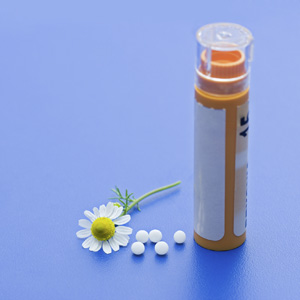
Homeopathy is a holistic, non-invasive, non-toxic, safe and complete system of medicine, based on an understanding of the interconnection between mind and body.
by Ben Ta’ati —
Short periods of anxiety may be experienced by almost everyone, but some individuals are more inclined to be troubled with this problem. Homeopathic remedies that treat acute conditions are available and can be readily purchased at most natural food stores.
One of these remedies is Argentum nitricum, which is derived from silver nitrate. It can be helpful for a short period of anxiety brought on by preparing for a big event: an exam, important interview, public appearance or social engagement. The physical symptoms include dizziness and diarrhea (see symptoms below).
People for whom this remedy works are often enthusiastic and suggestible, with a tendency toward peculiar thoughts and impulses. They often crave sweets and salt (which usually makes their symptoms worse). In cases where the anxiety has become chronic, meaning it has lasted more than a few days, a visit to a professional homeopath may be the answer.
Ours has been called the “age of anxiety,” with pervasive personal and societal reasons for insecurity and doubts. In fact, anxiety is the second most common psychological problem, next to alcoholism. Yet, only 23 percent of those afflicted seek treatment. Most people live with their anxiety, unaware that for as long as stress goes untreated, the likelihood increases that a more complicated disease will develop.
Anxiety is common in adolescence and is largely responsible for the tripling of the suicide rate in that age group over the last decades. Phobias also are common, taking the form of specific fears and social phobias, such as agoraphobia (fear of going out). A special category of anxiety is obsessive compulsive disorders (OCD), with drives, impulses and ritual behavior that must be performed in order to ease impending anxiety. OCD now affects 4 to 7 million Americans.
An individual suffering from OCD might think like this: “I couldn’t touch any doors or countertops in public areas. I was terrified that the germs could kill me! If I touched anything, I had to wash my hands for hours. Sometimes I washed them so much that my skin would become red and raw, and start to bleed.”
It is important for someone with OCD to be treated early since approximately 70 percent of adults with the disorder have an episode of major depression at some point in their lives.
Unfortunately, the solution that mainstream medicine has offered for anxiety and OCD is prescribing drugs such as Anafranil, Prozac, Zoloft, Paxil or Luvox, which can have life-threatening side effects. Joseph Glenmullen, M.D., a Harvard psychiatrist, in his book, Prozac Backlash, describes the dangers of these and other antidepressants: “In recent years, the danger of long-term side effects has emerged in association with Prozac-type drugs, making it imperative to minimize one’s exposure to them. Neurological disorders, including disfiguring facial and whole body tics, indicating potential brain damage, are an increasing concern with patients on the drugs.”
He also stated, “Sexual dysfunction affects 60 percent of people. There is evidence that they may effect a ‘chemical lobotomy’ by destroying the nerve endings that they target in the brain … and startling new information on Prozac’s precipitating suicidal and violent behavior has come to light.”
Here is a condition where a homeopathic treatment can do wonders for the patient. This energetic type of medicine helps the body reestablish balance and homeostasis. In fact, in the case of OCDs, Todd Rowe, M.D., a psychiatrist, comments that, “Not only does homeopathy treat the existing symptoms, but it also offers the possibility of a permanent cure.”
Homeopathy is a holistic, non-invasive, non-toxic, safe and complete system of medicine, based on an understanding of the interconnection between mind and body. Its aim is to treat the whole person, not just the disease. Instead of attacking symptoms with strong drugs, homeopathic remedies aim to stimulate and strengthen the immune system, thereby helping the body’s natural tendency to heal itself. And unlike strong antidepressants or tranquilizers, homeopathic remedies have no side effects, and are not addictive. They contain very diluted amounts and can be safely used alongside other forms of medical treatments.
Many patients become well enough to reduce or completely come off prescribed medicines. A visit to a homeopath is also a wonderful experience, in and of itself. Some homeopaths devote at least three hours to understand your physical and emotional state. They then search for one remedy out of 4,500 possibilities that matches the totality of the symptoms. The aim is to direct the body to complete the cycle it has already started.
This, in turn, will bring the body back to that balanced state it has been working toward. Once this happens, the body will no longer exhibit those symptoms of dis-ease or agitation.
Symptoms of anxiety
- Apprehensiveness and uneasiness
- Fearfulness, panic and phobias
- Insecurity and loss of confidence
- Irritability and restlessness
- Sleeping problems
- Palpitations, breathlessness and sweating
- Trembling, dizziness and weakness
- Weight gain
- Nausea, diarrhea or vomiting
- Inability to concentrate or think clearly
- Muscle tension
Ben Ta’ati, H.M.A., M.S.A., is a faculty member and practitioner of Classical Homeopathy at the American Medical College of Homeopathy. He is a member of the National Center for Homeopathy. 480-626-8485, ben@homeopathycare.org or www.MyArizonaHomeopath.com.
Reprinted from AzNetNews, Volume 27, Number 4, August/September 2008.





September 9, 2012
Anxiety, Children and Teens, Depression, Healing, Health, Homeopathy, OCD: Obsessive Compulsive Disorder